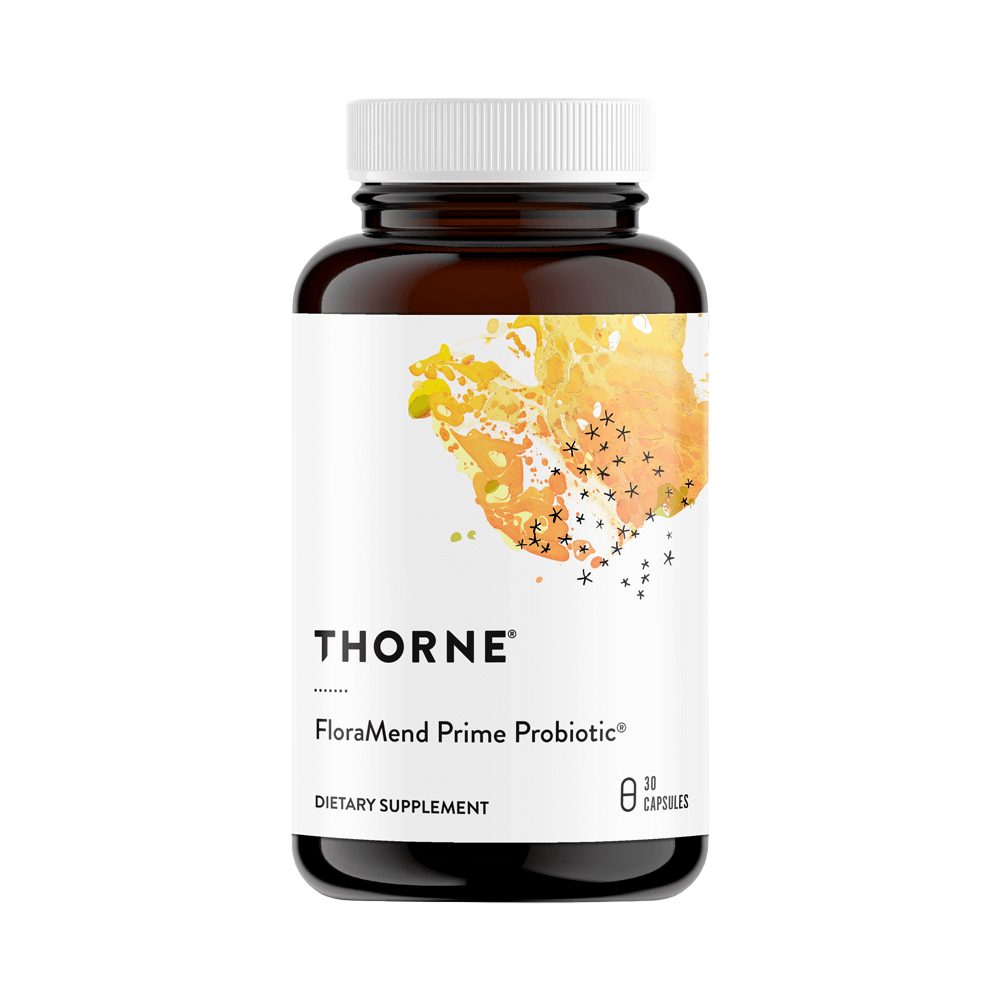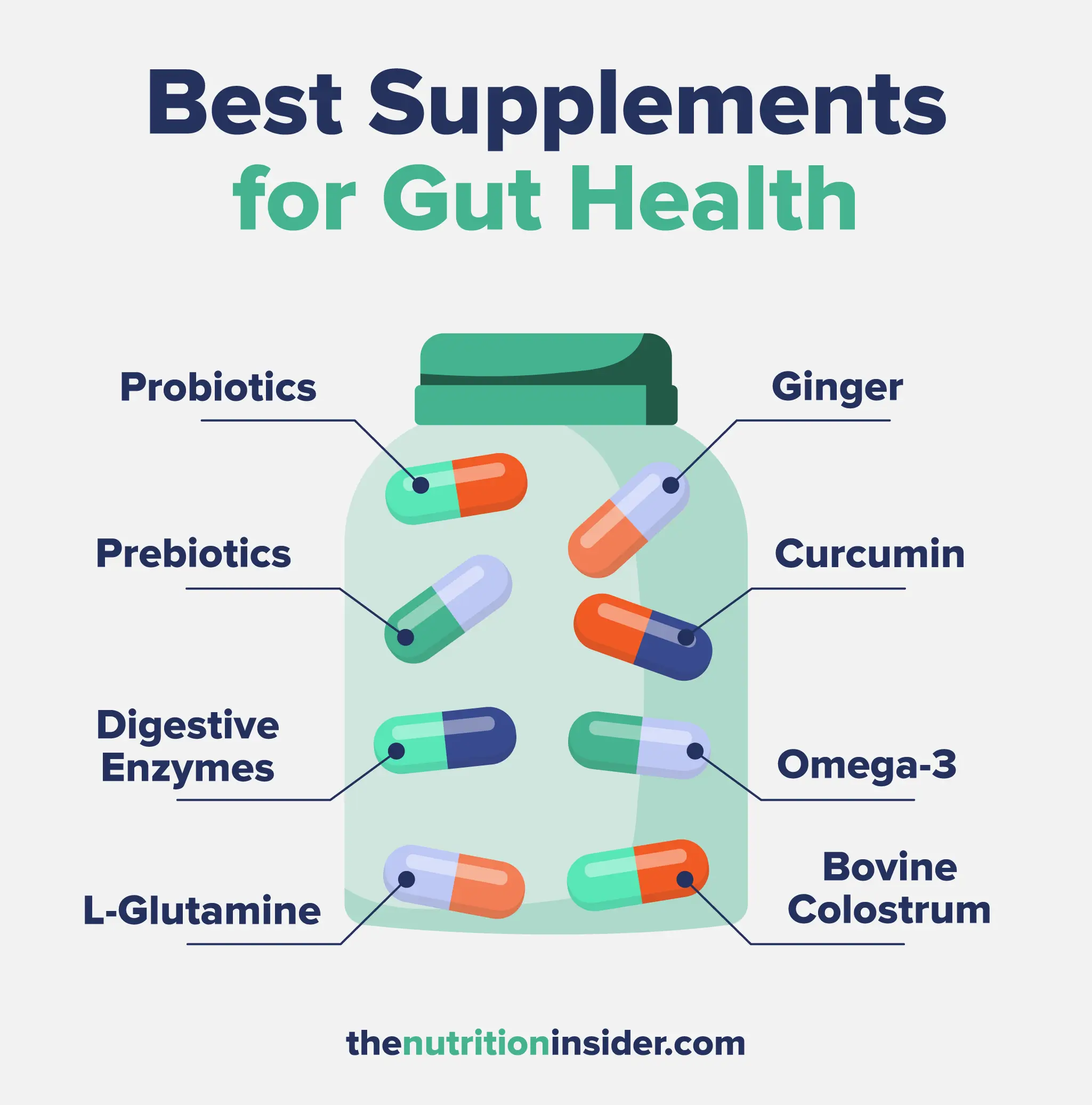Save $40 on your initial consult with a TNI Dietitian!
Talk to a real Dietitian for only $99: Schedule Now
This post contains links through which we may earn a small commission should you make a purchase from a brand. This in no way affects our ability to objectively critique the products and brands we review.
Evidence Based Research To fulfill our commitment to bringing our audience accurate and insightful content, our expert writers and medical reviewers rely on carefully curated research.
Read Our Editorial Policy
If you’re one of the millions of people dealing with not-so-perfect digestion, you’ve likely searched for the best supplements for gut health to help alleviate your symptoms.
Fortunately, many gut health supplements are not just pricey pills that don’t do anything—many can actually benefit digestive function and improve symptoms.
Although gut health supplements are not one-size-fits-all (for example, supplements that help constipation are not the same as those for leaky gut), this list details the top eight digestive supplements for various gut conditions and overall health that have research to back them up.
Map your microbiome triggers and eat without fear.
Map your microbiome triggers and eat without fear.


Thorne’s FloraMend Prime Probiotic is an acid-resistant supplement designed to support gut and immune health, with clinically studied benefits for weight management.

Probiotics are the most well-known gut health supplement, with the use of these healthy bacteria skyrocketing in recent years.
The word probiotic means “for life,” indicating that probiotics are live bacteria that benefit the host (us!).
Probiotic supplements have many potential benefits (for the gut and beyond, including mental health benefits). In the gut, probiotics may improve conditions or symptoms like bloating, constipation, SIBO (small intestinal bacterial overgrowth), irritable bowel syndrome, and inflammatory bowel disease.
Supplemental probiotics contain high amounts of certain bacteria. The most common genera found in probiotic supplements are lactic acid bacteria (like Lactobacillus, Bifidobacterium, Saccharomyces, Enterococcus, and Bacillus).
For example, a commonly used probiotic is Bifidobacterium (genera) animalis (species) lactis (subspecies) DN-173 010 (strain).
Research has shown that supplemental probiotics can help certain gut conditions. One meta-analysis of adults with IBS found that those who took the probiotic strains Bifidobacterium breve, Bifidobacterium longum, or Lactobacillus acidophilus had significant improvements in digestive pain scores compared to the placebo group.1
Another meta-analysis combined data from 15 clinical trials and showed that probiotic consumption reduced constipation by improving gut transit time (how quickly food passes through the digestive tract) by almost 14 hours.2
Check out our top recommendations for probiotic supplements for women and men in these articles.
Prebiotics are another beneficial gut health supplement, which are different from probiotics. Whereas probiotics are beneficial bacteria that live in the gut microbiome, prebiotics are a type of fiber that probiotics consume to stay alive and thrive.
This type of fiber is not digested or absorbed by our digestive systems—rather, gut bacteria digest and eat them.
The breakdown of prebiotic fibers stimulates the growth of Bifidobacterium, one of those healthy probiotic bacteria known to improve gut health.
A primary reason why prebiotics are so beneficial to the gut is because they lead to the production of short-chain fatty acids. Short-chain fatty acids (SCFAs) are beneficial fermentation byproducts known as metabolites that are produced when our gut bacteria feed on prebiotic fibers.
One of the SCFAs is butyrate, an essential nutrient that helps colonocytes (colon cells) grow and thrive, promotes normal colon cell growth, supports healthy mucus production, and strengthens the intestinal barrier (gut lining).
As they are a type of fiber, prebiotics are particularly beneficial for helping with constipation. However, some people with IBS or diarrhea find that prebiotics make their symptoms worse.
When prebiotics and probiotics are found together in a supplement, it’s called a synbiotic to denote their synergistic behavior. A full list of our top-rated prebiotic supplements can be found in this article: Best Prebiotics for Gut Health.
Digestive enzymes are proteins that help break down food into smaller building blocks that our cells can use. For example, proteases help to break down protein-rich foods into smaller compounds called amino acids.
Although our guts naturally contain digestive enzymes, we start to lose some of their power with age, stress, disease, or poor diet. Not having adequate digestive enzyme functioning can lead to incomplete food breakdown, causing digestive issues like bloating, diarrhea, and reflux.
There are single-enzyme supplements (like lactase to break down dairy sugars in people who are lactose intolerant) or broad-spectrum digestive enzyme supplements designed to help you comfortably eat a wide range of foods.
The three most common digestive enzymes are amylase (to break down starchy carbohydrates), protease (protein), and lipase (fats). Other digestive enzymes may include bromelain or papain, which are found naturally in pineapple and papaya, respectively, and break down protein. Another common enzyme in digestive supplements is alpha-galactosidase, which breaks down carbs in beans (you may recognize it as Bean-O).
Some research has shown that people with both IBS and IBD who took digestive enzymes saw significant improvements in bloating, gas, and abdominal pain compared to those who just took their regular IBD medication.3
L-glutamine is an amino acid that may benefit people with impaired intestinal permeability (leaky gut) or IBD.
Glutamine helps prevent leaky gut by acting as a sealant between the thin lining of epithelial cells in our intestines. Epithelial cells are joined together by proteins called tight junctions, and glutamine modulates the activity of these proteins to strengthen their links.4
Glutamine also acts as a fuel source for epithelial cells, allowing them to grow and thrive.
However, while some research has shown that glutamine can reduce intestinal permeability, not all studies have shown beneficial effects on disease parameters in IBD. It’s thought that results may differ based on whether or not someone is replete in glutamine already.5,6
Ginger is known for its anti-inflammatory properties and ability to help with nausea and indigestion. Although ginger has been used for nausea in herbal remedies dating back centuries, there is also plenty of modern research to back up these claims.7
Studies show that ginger can reduce nausea and vomiting during pregnancy and chemotherapy—two conditions that cause nausea frequently.8
Ginger can help with digestion by improving gastric emptying rates, which can reduce bloating, heartburn, dyspepsia (indigestion), and intestinal cramping.
A study of adults with functional dyspepsia found that taking a ginger and artichoke extract supplement before meals significantly reduced nausea, bloating, gastric pain, and fullness. After 28 days of supplementation, 86% of patients in the supplemental group reported their indigestion was resolved.9
Ginger may also help reduce inflammation in IBD (ulcerative colitis or Crohn’s disease) due to the anti-inflammatory effects of gingerols—the primary phenolic compounds in ginger that inhibit pro-inflammatory pathways.10
That said, ginger may not help with other digestive problems, such as constipation, diarrhea, or IBS.
Curcumin (found in turmeric) is another compound with potent anti-inflammatory and antioxidant properties, which lend themselves to helping with inflammation-related gut conditions (like IBD).
Research shows that curcumin can help to treat and manage IBD symptoms, including keeping the disease in remission.11 Another study found that curcumin benefits people with mild gastrointestinal complaints. Those who took curcumin extract for eight weeks had significant improvements on the Gastrointestinal Symptom Rating Scale (GSRS), which measures self-reported symptoms like diarrhea, constipation, bloating, gas, abdominal pain, reflux, and indigestion.12
Omega-3 fatty acids (found widely in fish oil supplements) are another anti-inflammatory supplement that can benefit the gut.
Studies have suggested that greater omega-3 intake can help promote a healthy gut microbiome, in addition to increasing the production of anti-inflammatory SCFAs like butyrate.13
Omega-3s can also help to strengthen the integrity of the intestinal lining, which is necessary to prevent a leaky gut.14
That said, digestive-related symptoms like belching, indigestion, and heartburn are common side effects of taking fish oil supplements, so starting with smaller doses is advised.
Lastly, a newer gut health supplement that you’ve probably seen circulating on social media is bovine colostrum. Human breastmilk colostrum is known to improve digestive health in infants, and the same seems to be true for adults taking bovine colostrum.
While colostrum itself is certainly not new (it’s the “first milk” that comes after a lactating woman gives birth), bovine colostrum supplements have recently become popular for their role in supporting a healthy immune system and gut.
Bovine colostrum has anti-inflammatory and immune-supporting properties, which makes it beneficial for conditions like IBD, leaky gut, and diarrhea.
Research suggests that colostrum benefits the gut by stimulating the growth of intestinal cells, strengthening the mucosal lining, reducing inflammation and damage, improving gut microbiome composition, and modulating the gut-immune response.15
One small study with athletes found that taking 20g of bovine colostrum per day blunted the typical post-exercise rise in intestinal permeability by 80%, whereas people in the placebo group had a 2.5-fold increase in gut permeability.16
Another very small study of just 14 people with ulcerative colitis (UC) found that those who were taking traditional UC medications in addition to bovine colostrum in enema form had a greater reduction in UC symptoms than those taking the medication alone.17
It depends! If you have a chronic digestive condition or often suffer from digestive symptoms (like gas, bloating, indigestion/reflux, constipation, or diarrhea), then gut health supplements may help. Most people can benefit from a high-quality synbiotic (probiotic plus prebiotic combination), while other supplements may be better targeted for a specific condition. For example, ginger helps with indigestion, reflux, and nausea, while curcumin and omega-3 fats can help more with inflammatory conditions like IBD (as well as overall gut health).
Apple cider vinegar can be beneficial for gut health in some people, although the research is limited. Only apple cider vinegar with the “mother” intact provides benefits. The mother is the cloudy sediment made up of bacteria and yeast that provide some beneficial bacteria to the gut. However, the amount of probiotics provided is likely small.
Dietary supplements that can be good for gut health include probiotics, prebiotics, digestive enzymes, L-glutamine, ginger, curcumin, omega-3 fats, and bovine colostrum. However, you certainly do not need to take all of these for good gut health, and most are beneficial for specific gut conditions rather than necessary for the general person with a healthy gut to take.